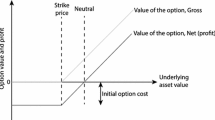Abstract
The irreversibility effect implies that a decision maker who neglects the prospect of receiving more complete information at later stages of a sequential decision problem will in certain cases too easily take an irreversible decision, as he ignores the existence of a positive option value in favour of reversible decisions. This option value represents the decision maker's flexibility to adapt subsequent decisions to the obtained information. In this paper we show that the economic models dealing with irreversibility as used in environmental and capital investment decision making can be extended to emergency response decisions that produce important irreversible effects. In particular, we concentrate on the decision whether or not to evacuate an industrial area threatened by a possible nuclear accident. We show in a simple two-period evacuation decision model that non-optimal conclusions may be drawn when evacuation is regarded as a `now or never decision'. The robustness of these results is verified by means of a sensitivity analysis of the various model parameters. The importance of `options thinking' in this decision context is illustrated in an example.
Similar content being viewed by others
REFERENCES
Arrow, K.J. & Fisher, A.C. (1974), Environmental preservation, uncertainty and irreversibility, Quarterly Journal of Economics 88: 312–319.
Dixit, A.K. & Pindyck, R.S. (1994), Investment under uncertainty (Princeton, Princeton University Press).
Dixit, A.K. & Pindyck, R.S. (1995), The options approach to capital investment, Harvard Business Review, 105–115.
Ehrhardt, J., Päsler-Sauer, J., Schule, O., Benz, G., Rafat, M. & Richter, J. (1993), Development of RODOS, a comprehensive decision support system for nuclear emergencies in Europe – an overview, Radiation Protection Dosimetry 50(1): 195–203.
Epstein, L.G. (1980), Decision making and the temporal resolution of uncertainty, International Economic Review 21(2): 269–283.
Freixas, X. & Laffont, J. (1984), On the irreversibility effect, in M. Boyer and R. Kihlstrom (eds.), Bayesian Models in Economic Theory (North-Holland, Amsterdam), pp. 105–114.
French, S. (1996), Multi-attribute decision support in the event of a nuclear accident, Journal of Multi-Criteria Decision Analysis 5: 39–57.
French, S., Harisson, M.T. & Raynard, D.C. (1997), Event conditional attribute modelling in decision making when there is a threat of a nuclear accident, in S. French & J.Q. Smith (eds.), Bayesian Analysis in Practice (London, Edward Arnold), pp. 131–149.
Govaerts, P., Declercq-Versele, H., Samain, J.P. & Walthoff, P. (1991), Nuclear emergency planning and response in an industrial area, in Proceedings of the International Seminar on Intervention Levels and Countermeasures for Nuclear Accidents, CEC, Cadarache.
Hanemann,.M. (1989), Information and the concept of option value, Journal of Environmental Economics and Management 16: 23–27.
Hardeman, F., Pauwels, N., Van de Walle, B., Deboodt, P. & De Meester, P. (1998), The monetary value of the man. Sievert. A practical approach in case of occupational exposures, Health Physics 74(3): 330–336.
Henry, C. (1974a), Investment decisions under uncertainty: The irreversibility effect, American Economic Review 64: 1006–1012.
Henry, C. (1974b), Option values in the economics of irreplaceable assets, Review of Economic Studies 41: 89–104.
International Commission on Radiological Protection (ICRP). (1990), 1990 Recommendations of the International Commission on Radiological Protection, ICRP Publication 60 (Oxford, Pergamon Press).
Jones, R.A. & Ostroy, J.M. (1984), Flexibility and Uncertainty', Review of Economic Studies 51: 13–32.
McDonald, R. & Siegel, D. (1986), The value of waiting to invest, Quarterly Journal of Economics 101(4): 707–727.
Pauwels, N., Van deWalle, B., Hardeman, F. & Soudan, K. (1996), Nuclear incident response in industrial areas: Assessing the economic impact of the decision to evacuate, in Proceedings of the Combined 3rd COSYMA and International MACCS Users Group Meeting, KEMA, Arnhem, pp. 173–181.
Pindyck, R.S. (1991), Irreversibility, uncertainty, and investment, Journal of Economic Literature 29: 1110–1148.
Ramani, S.V., Richard, A & Trometter, M. (1992), Une approche élargie de l'effet irréversibilité. Application au cas de la conservation de la biodiversité, Revue économique 43: 769–784.
Ramani, S.V. & Richard, A. (1993), Decision, irreversibility and flexibility: The irreversibility effect re-examined, Theory and Decision 35: 259–276.
Rasmussen, N.C. (1975), Reactor Safety Study, WASH-1400, NUREG 75/014,US Nuclear Regulatory Commission.
Rauchs, A. & Willinger, M. (1996), Experimental evidence on the irreversibility effect, Theory and Decision 40: 51–78.
Royal Decree of 27 September 1991 (In Dutch:Koninklijk Besluit van 27 September 1991 tot vaststelling van het noodplan voor nucleaire risico's voor het Belgisch grondgebied, Belgisch Staatsblad, 21 januari 1992).
Schneider, T., Schieber, C., Eeckhoudt, L. & Gollier C. (1997), Economics of radiation protection: Equity considerations, Theory and Decision 43: 241–251.
Stokell, P.J., Croft, J.R., Lochard, J. & Lombard J. (1991), Radiation Protection. ALARA from Theory towards Practice, EUR 13796 EN, CEC, Luxembourg.
Vanmarcke, H., Verbruggen, A. & Sohier, A. (1995), Report on the Belgian Elicitation Exercise conducted within the RODOS-project, Report BLG-697, SCK-CEN, Mol.
Rights and permissions
About this article
Cite this article
Pauwels, N., Van De Walle, B., Hardeman, F. et al. The implications of irreversibility in emergency response decisions. Theory and Decision 49, 25–51 (2000). https://doi.org/10.1023/A:1005155426945
Issue Date:
DOI: https://doi.org/10.1023/A:1005155426945




